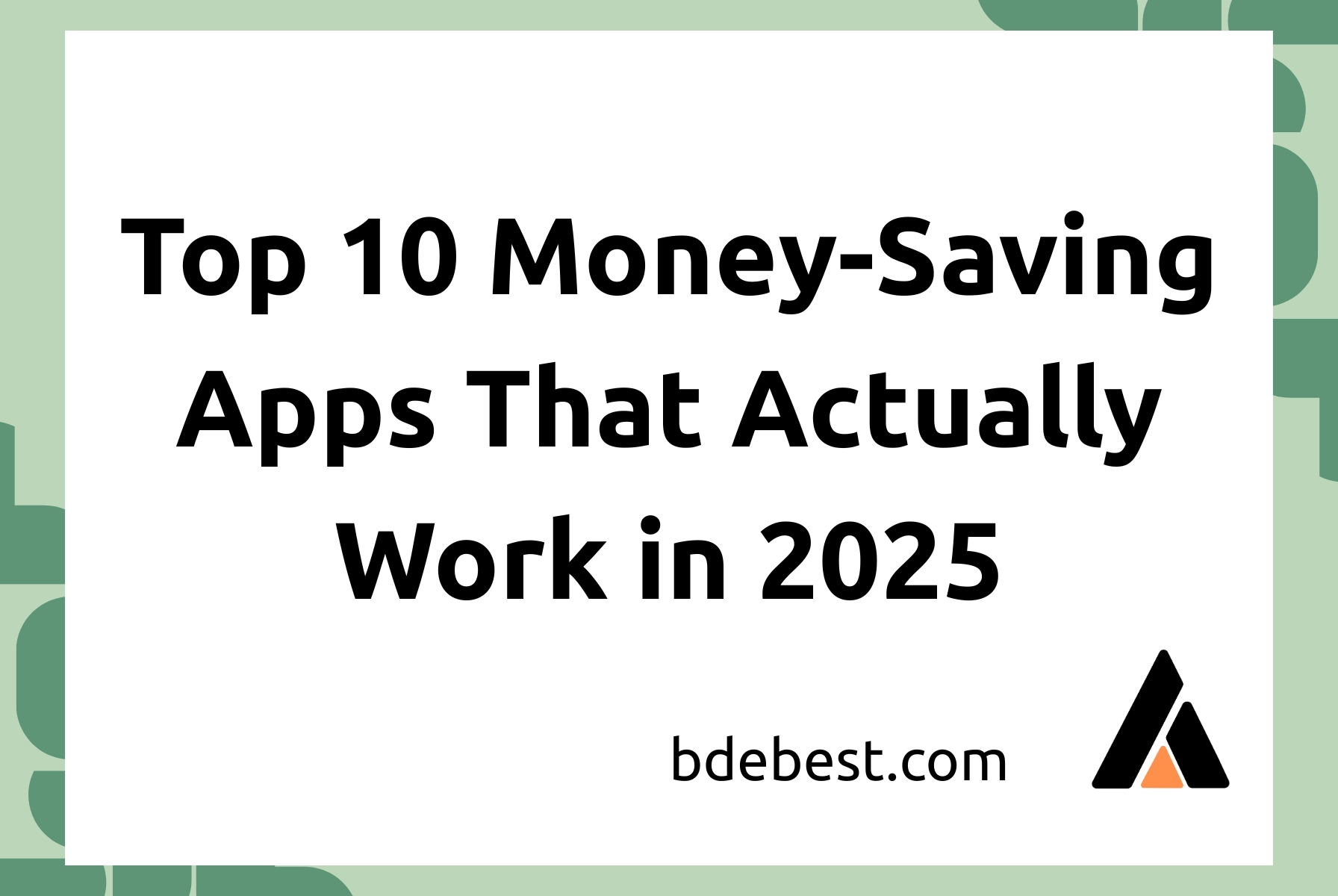In 2025, saving money isn’t just a good habit — it’s a financial survival skill. With rising living costs, fluctuating economies, and an endless stream of digital subscriptions draining our wallets, it’s become more important than ever to get smarter about personal finance.
Thankfully, the same tech that’s making life expensive is also helping people save more effectively. A new generation of money-saving apps in 2025 has emerged, using artificial intelligence, automation, and intuitive design to help everyday users take control of their spending.
Whether you’re a tech-savvy saver, someone living on a tight budget, or just exploring smarter ways to handle money, this article is your ultimate guide. We’ve carefully curated a list of the top 10 budgeting tools and finance apps that actually work — tried, tested, and updated for 2025.
These apps aren’t just hype — they’re real tools for real people who want to save more without sacrificing their lifestyle.
1. What Makes a Great Money-Saving App?
Before jumping into the top picks, it’s important to understand what sets the best finance apps apart in 2025. Given the wide variety of choices, here’s what you should focus on:
✅ Key Features of the Best Budgeting Apps:
- Budget Tracking: Visual breakdowns of income vs. expenses
- Smart savings: Tools powered by AI that automatically put money aside without any manual effort.
- Subscription Canceling: Identify and cancel unwanted recurring charges
- Investment Insights: Entry-level guidance and tools to grow your money
- User-Friendly Design: Easy navigation and clean dashboards that make finance less intimidating
Security & Privacy Are Non-Negotiable
With access to your sensitive financial information, a great app must offer bank-level encryption, secure logins, and clear privacy policies. In 2025, apps that prioritize user trust stand out from the rest.
Mobile vs. Web-Based Tools
While most apps now offer mobile-first solutions, the best ones seamlessly sync across platforms — be it Android, iOS, or your desktop browser — for real-time financial control.
For Beginners and Power Users
Whether you’re just starting your savings journey or you’re a financial planning pro, a top-tier app should adapt to your skill level and goals. Personalization is key.
Suggested SEO keywords: top features of budgeting apps, beginner-friendly finance tools.
2. The Top 10 Money-Saving Apps in 2025
Each of these apps is unique in its own way, offering powerful tools to help you save smarter, spend more consciously, and build better financial habits.
2.1. Rocket Money (formerly Truebill)
- Platform: Android, iOS
- Key Features:
- Smart subscription detection and cancelation
- Bill negotiation services
- AI-powered expense tracking
Pros:
- Automatically lowers bills
- Identifies hidden subscriptions
- User-friendly interface
Cons:
- Premium features behind a paywall
Best For:
Users looking to cut wasteful spending and streamline their monthly bills.
How It Saves You Money:
By canceling unused subscriptions and negotiating bills on your behalf.
2.2. YNAB (You Need A Budget)
- Platform: Android, iOS, Web
- Key Features:
- Real-time budget syncing
- Goal setting and debt tracking
- Proactive budgeting method
Pros:
- Highly customizable
- Educational support for users
Cons:
- Slight learning curve
- Subscription fee
Best For:
Financial planners who want full control and visibility over every dollar.
How It Saves You Money:
Helps you spend with purpose while planning ahead for future expenses.
2.3. PocketGuard
- Platform: Android, iOS
- Key Features:
- “In My Pocket” safe-to-spend balance
- Tracks bills and income
- Categorized expense reports
Pros:
- Simple, clear visual dashboard
- Advanced security (bank-level encryption)
Cons:
- Limited customization in free version
Best For:
Busy individuals who need quick budget insights without the complexity.
How It Saves You Money:
Helps you avoid overspending by showing what’s truly available to spend.
2.4. Goodbudget
- Platform: Android, iOS, Web
- Key Features:
- Envelope-style budgeting
- Shared budgets for couples or roommates
- Sync across multiple devices
Pros:
- Ideal for shared financial goals
- Intuitive and easy for beginners
Cons:
- Manual transaction entry
Best For:
Couples, families, or roommates managing joint finances.
How It Saves You Money:
Promotes planned spending through virtual envelopes to prevent impulse purchases.
2.5. Chime
- Platform: Android, iOS
- Key Features:
- No-fee mobile banking
- Automatic savings on every transaction
- Early direct deposit
Pros:
- No hidden fees
- Fast account setup
Cons:
- Not a traditional budgeting app
Best For:
Anyone seeking a free, savings-friendly digital banking experience.
How It Saves You Money:
Automatically rounds up purchases and deposits savings, making saving effortless.
2.6. Digit
- Platform: Android, iOS
- Key Features:
- AI-based micro-saving
- New in 2025: investment tools & custom goals
- Overdraft prevention
Pros:
- Smart, adaptive savings
- Set-it-and-forget-it simplicity
Cons:
- Monthly fee after trial
Best For:
Ideal for individuals who find it hard to save consistently and benefit from automation.
How It Saves You Money:
Analyzes spending habits and transfers small, safe amounts into savings.
2.7. Honeydue
- Platform: Android, iOS
- Key Features:
- Couples’ budget planner
- Shared account viewing
- Bill reminders and note sharing
Pros:
- Strengthens financial communication
- Easy to split expenses
Cons:
- Limited features outside couple-based use
Best For:
Couples aiming for transparency and shared savings goals.
How It Saves You Money:
Helps couples avoid miscommunication around money and stay accountable.
2.8. Simplifi by Quicken
- Platform: Android, iOS, Web
- Key Features:
- Real-time budget tracking
- Customizable savings targets
- Weekly and monthly summaries
Pros:
- Clean interface
- Great for long-term savings planning
Cons:
- Requires a subscription
Best For:
Users looking to build and track specific savings goals over time.
How It Saves You Money:
Keeps you on track with real-time alerts and progress reports.
2.9. Acorns
- Platform: Android, iOS, Web
- Key Features:
- Round-up investing
- Pre-built portfolios for beginners
- Integrated savings and checking
Pros:
- Great introduction to investing
- Set-it-and-forget-it savings
Cons:
- Small fees on small balances
Best For:
First-time investors who want to save and grow money passively.
How It Saves You Money:
Turns your spare change into a micro-investment portfolio.
2.10. Cleo
- Platform: Android, iOS, Facebook Messenger
- Key Features:
- AI-powered financial coaching
- Daily insights and spending challenges
- Humorous chatbot interface
Pros:
- Gamified saving experience
- Entertaining yet effective
Cons:
- Not ideal for complex budgeting
Best For:
Young adults and tech lovers who enjoy engaging, gamified finance apps.
How It Saves You Money:
Adds a fun element to learning about money, making regular saving feel like a rewarding habit.
3. Finding the Best App Based on Your Personal Savings Habits
Choosing the best app to save money in 2025 isn’t just about flashy features — it’s about aligning the app with your personal or family financial goals. Here’s how to make the right pick:
✅ Match Features to Your Financial Goals
Whether you’re saving for a vacation, building an emergency fund, or paying off debt, look for apps that cater to your needs.
- Want goal-based savings? Choose apps like Qapital or Simple.
- Need better budget control? Go for YNAB or Goodbudget.
✅ Free vs. Paid Apps — What’s Worth Paying For?
Free apps are great for basic budgeting. But premium versions often unlock:
- Advanced analytics
- Personalized financial coaching
- Credit score tracking
If you’re serious about saving and need accountability, a paid app can be a worthwhile investment.
✅ Are You Budgeting Alone or With Others?
- For solo savers: Simple solutions like PocketGuard or Daily Budget may be all you need.
- Couples & Families: Choose collaborative tools like Honeydue or Goodbudget that support shared budgets and expense tracking.
✅ Don’t Ignore App Reviews and Updates
Consistent updates show the app developers are focused on enhancing security and user satisfaction.
Also, check app store ratings and recent user reviews to avoid buggy or outdated tools.
Pro Tip: Always test a few apps before committing to one. Most paid apps offer free trials.
4. Tips to Maximize the Benefits of Money-Saving Apps
Downloading a budgeting app is just step one. To truly benefit, you need to build smart money habits around it. Here are some practical saving app tips:
Set Realistic Savings Goals
Start small — say, $20 a week. Seeing regular progress keeps you motivated. Most apps let you name and track specific goals like “New Laptop” or “Holiday Fund”.
Automate Wherever Possible
Automation reduces the chance of skipping savings. Enable features like automated transfers, scheduled bill alerts, and spare-change savings to simplify your process.
Review and Adjust Monthly
Life changes — your budget should too. Use your app’s monthly reports to:
- Identify overspending categories
- Reallocate funds
- Refine your goals
⚠️ Watch for Hidden Fees and Subscriptions
Some apps charge monthly fees or offer in-app purchases that add up.
- Stick with transparent pricing
- Cancel unused subscriptions using tools like Truebill or Rocket Money
Remember: A budgeting app is a tool, not a magic wand. These apps are most effective when used with steady habits and personal commitment.
Money-saving apps are no longer optional in 2025 — they’re essential tools for smart money management. From automated saving goals to real-time budget tracking, these apps empower you to take control of your financial future.
Every user is different, so don’t hesitate to try a few and find the one that matches your needs. Whether you’re a college student, freelancer, or parent, there’s a perfect budgeting tool out there for you.
What’s your favorite money-saving app? Join the conversation in the comments — your insight could help others improve their financial habits!
5. FAQ Section
❓ What is the best money-saving app in 2025?
The “best” depends on your needs, but top-rated apps in 2025 include YNAB, Rocket Money, and Qapital for different savings styles and goals.
❓ Are money-saving apps safe to use?
Yes, most reputable apps use bank-level encryption and two-factor authentication. Always choose apps with high ratings and transparent privacy policies.
❓ Do I need to link my bank account to use a budgeting app?
Not always. Some apps like Goodbudget allow manual input. However, linking accounts can automate tracking and improve accuracy.
❓ Can budgeting apps help with debt repayment?
Absolutely. Many apps let you allocate extra funds toward debts and visualize progress. Apps like Undebt.it or YNAB are particularly good for this.
❓ Is there a free budgeting app that actually works?
Absolutely. Free apps such as PocketGuard, Daily Budget, and Goodbudget deliver strong functionality with no subscription cost.







